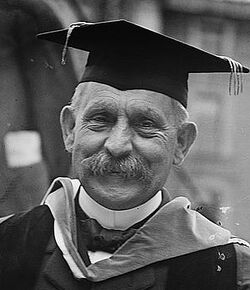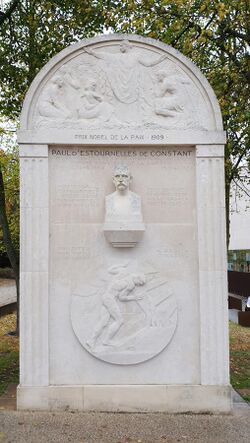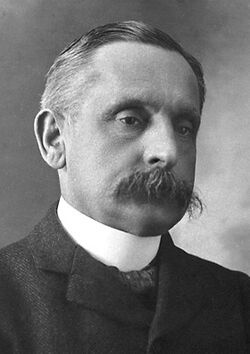Biography:Paul Henri Balluet d'Estournelles de Constant
Paul Henri Benjamin Balluet d'Estournelles de Constant, Baron de Constant de Rebecque (22 November 1852 – 15 May 1924), was a French diplomat and politician, advocate of international arbitration and winner of the 1909 Nobel Prize for Peace.[1]
Biography

He was born at La Flèche (Sarthe) in the Loir valley to the Constant de Rebecque family; the renowned French Revolution -era writer and politician Benjamin Constant was his great-uncle. After studying law and Oriental languages at the Lycée Louis-le-Grand in Paris, Estournelles de Constant embarked on a diplomatic career in 1876.
Among Estournelles de Constant's early diplomatic posts were Montenegro, the Ottoman Empire, the Netherlands, Great Britain, and Tunisia; in 1882 he returned to Paris to serve as assistant director of the Levant bureau of the Ministry of Foreign Affairs. In 1890 he was posted to London as the French chargé d'affaires, where he played a role in averting war with United Kingdom over colonial disputes. Frustrated by the limitations of diplomatic service, he ran for parliament in 1895, securing a seat in the Chamber of Deputies. In 1904 Estournelles de Constant ran for and won a seat in the Senate, where he served until the end of his career in 1924.

As a deputy and senator, Estournelles de Constant concerned himself with colonial issues, consistently opposing Third Republic colonial policy. He advocated the elimination of colonial seats in the French parliament, preferring a policy of establishing protectorates to the traditional republican programme of colonial assimilation. In particular, he violently opposed the establishment of French colonial rule in Madagascar and the Great Powers' dismemberment of China . In domestic affairs, he was concerned particularly with what the terminology of the day called "outrages against morality" (outrages aux bonnes mœurs). He was a Dreyfusard and argued in favour of placing Émile Zola's remains in the Panthéon for Zola's part in the Dreyfus Affair.
Above all, though, Estournelles de Constant dedicated himself to the cause of improving international relations, and he was a member of the Permanent Court of Arbitration from 1900. He represented France at both Hague Peace Conferences (1898 and 1907), and outlined a vision of a European union.
Estournelles de Constant wrote historical and political works and even dabbled in playwriting. In addition, he was a regular contributor to the newspapers Le Temps, La Revue de Paris, and La Revue des deux mondes. Married to an American, Daisy Sedgwick Berend, he also travelled extensively in and wrote about the United States .
Estournelles de Constant's name may be encountered in numerous variants; the article title reflects the form standardized by the Bibliothèque nationale de France.
From 1904, and more officially from 1905, Paul d'Estournelles de Constant chaired the Association de Conciliation Internationale, with which he tried to influence international policies towards arbitration, disarmament and peace16.
Estournelles de Constant was elected an International Member of the American Philosophical Society in 1907.
In 1899, then in 1907, Paul d'Estournelles de Constant represented France, with Léon Bourgeois and Louis Renault, at the Hague Conferences. Its aim is to work for the peaceful settlement of international conflicts by promoting mediation, and especially international arbitration. He helped Léon Bollée, the main supporter of the American Wilbur Wright, an aviation pioneer, in his aeronautical experiments carried out between August 8, 1908 and January 2, 1909, at Le Mans and in Sarthe, on the Hunaudières racecourse then at the Auvours military camp.
Paul d'Estournelles de Constant receives the Nobel Peace Prize on December 10, 1909, jointly with the Belgian deputy Auguste Beernaert, for their efforts in the construction of international law, in particular in the organization of the conferences of The Hague of 1899 and 1907 which lead to the creation of a Permanent Court of Arbitration17. He was the third Frenchman to receive this distinction after Frédéric Passy, in 1901, and Louis Renault, in 190718. The news of this appointment had little echo in the national press, because only the newspaper La Croix announced it on the front page. 17.[2][circular reference]
Posterity

In La Flèche (Sarthe), his hometown, two schools bear his name: the Estournelles de Constant General and Technological High School, and the Estournelles de Constant Kindergarten.
An amphitheatre bears his name at the UFR (Training and Research Unit) of Law, Economic Sciences and Management of the University of Maine (Université du Maine).
A monument, including a bust by Paul Landowski, also pays tribute to him on the “Place des Jacobins” (Jacobins Square), at Le Mans (coordinates: Template:Location).
Sources
- Jolly, Jean, dir. Dictionnaire des parlementaires français: Notices biographiques sur les ministres, députés et sénateurs français de 1889 à 1940. 6 vols. Paris: Presses universitaires de France, 1960–70.
- "Paul Henri d'Estournelles de Constant—Biography".
Further reading
- Stéphane Tison (ed.), Paul d'Estournelles de Constant. Concilier les nations pour éviter la guerre (1878-1924), Rennes, Presses universitaires de Rennes, 2015.
- Laurent Barcelo, Paul d'Estournelles de Constant : L'expression d'une idée européenne, Paris, L'Harmattan, 1995.
Notes
- ↑ "Paul Henri d'Estournelles de Constant – Biographical. NobelPrize.org. Nobel Media AB 2018.". 25 Sep 2018. https://www.nobelprize.org/prizes/peace/1909/balluet/biographical/.
- ↑ :fr:Paul Henri Balluet d%27Estournelles de Constant#Post%C3%A9rit%C3%A9
External links
- Report of the International Commission to Inquire into the Causes and Conduct of the Balkan Wars. Washington, D.C.: Carnegie Endowment for International Peace. 1914. https://archive.org/details/reportofinternat00inteuoft. Retrieved 27 September 2018.
- *Template:20th Century Press Archives – FID missing or invalid*
- Miss nobel-id as parameter
- Error in Template:Internet Archive author: Paul Henri Balluet d'Estournelles de Constant doesn't exist.
{{Navbox | name = Nobel Peace Prize laureates | state = autocollapse | bodyclass = hlist | title = Laureates of the Nobel Peace Prize | nowrapitems = yes
| group1 = 1901–1925 | list1 =
- 1901: [[Biography:Henry DunHenry Dunant / Frédéric Passy
- 1902: Élie Ducommun / Charles Gobat
- 1903: Randal Cremer
- 1904: Institut de Droit International
- 1905: Bertha von Suttner
- 1906: Theodore Roosevelt
- 1907: Ernesto Moneta / Louis Renault
- 1908: Klas Arnoldson / Fredrik Bajer
- 1909: A. M. F. Beernaert / Paul Estournelles de Constant
- 1910: International Peace Bureau
- 1911: Tobias Asser / Alfred Fried
- 1912: Elihu Root
- 1913: Henri La Fontaine
- 1914
- 1915
- 1916
- 1917: International Committee of the Red Cross
- 1918
- 1919: Woodrow Wilson
- 1920: Léon Bourgeois
- 1921: Hjalmar Branting / Christian Lange
- 1922: Fridtjof Nansen
- 1923
- 1924
- 1925: Austen Chamberlain / Charles Dawes
| group2 = 1926–1950 | list2 =
- 1926: Aristide Briand / Gustav Stresemann
- 1927: Ferdinand Buisson / Ludwig Quidde
- 1928
- 1929: Frank B. Kellogg
- 1930: Nathan Söderblom
- 1931: Jane Addams / Nicholas Butler
- 1932
- 1933: Norman Angell
- 1934: Arthur Henderson
- 1935: Carl von Ossietzky
- 1936: Carlos Saavedra Lamas
- 1937: Robert Cecil
- 1938: Nansen International Office for Refugees
- 1939
- 1940
- 1941
- 1942
- 1943
- 1944: International Committee of the Red Cross
- 1945: Cordell Hull
- 1946: Emily Balch / John Mott
- 1947: Friends Service Council / American Friends Service Committee
- 1948
- 1949: John Boyd Orr
- 1950: Ralph Bunche
| group3 = 1951–1975 | list3 =
- 1951: Léon Jouhaux
- 1952: Albert Schweitzer
- 1953: George Marshall
- 1954: United Nations High Commissioner for Refugees
- 1955
- 1956
- 1957: Lester B. Pearson
- 1958: Georges Pire
- 1959: Philip Noel-Baker
- 1960: Albert Lutuli
- 1961: Dag Hammarskjöld
- 1962: Linus Pauling
- 1963: International Committee of the Red Cross / League of Red Cross Societies
- 1964: Martin Luther King Jr.
- 1965: UNICEF
- 1966
- 1967
- 1968: René Cassin
- 1969: International Labour Organization
- 1970: Norman Borlaug
- 1971: Willy Brandt
- 1972
- 1973: Lê Đức Thọ (declined award) / Henry Kissinger
- 1974: Seán MacBride / Eisaku Satō
- 1975: Andrei Sakharov
| group4 = 1976–2000 | list4 =
- 1976: Betty Williams / Mairead Corrigan
- 1977: Amnesty International
- 1978: [[Biography:Anwar SaAnwar Sadat{{\}}Menachem Begin
- 1979: Mother Teresa
- 1980: Adolfo Pérez Esquivel
- 1981: United Nations High Commissioner for Refugees
- 1982: Alva Myrdal / Alfonso García Robles
- 1983: Lech Wałęsa
- 1984: Desmond Tutu
- 1985: International Physicians for the Prevention of Nuclear War
- 1986: Elie Wiesel
- 1987: Óscar Arias
- 1988: UN Peacekeeping Forces
- 1989: Tenzin Gyatso (14th Dalai Lama)
- 1990: Mikhail Gorbachev
- 1991: Aung San Suu Kyi
- 1992: Rigoberta Menchú
- 1993: Nelson Mandela / F. W. de Klerk
- 1994: Shimon Peres / Yitzhak Rabin / Yasser Arafat
- 1995: Pugwash Conferences / Joseph Rotblat
- 1996: Carlos Belo / José Ramos-Horta
- 1997: International Campaign to Ban Landmines / Jody Williams
- 1998: John Hume / David Trimble
- 1999: Médecins Sans Frontières
- 2000: Kim Dae-jung
| group5 = 2001–present | list5 =
- 2001: United Nations / Kofi Annan
- 2002: Jimmy Carter
- 2003: Shirin Ebadi
- 2004: Wangari Maathai
- 2005: International Atomic Energy Agency / Mohamed ElBaradei
- 2006: Grameen Bank / Muhammad Yunus
- 2007: Al Gore / Intergovernmental Panel on Climate Change
- 2008: Martti Ahtisaari
- 2009: Barack Obama
- 2010: Liu Xiaobo
- 2011: Ellen Johnson Sirleaf / Leymah Gbowee / Tawakkol Karman
- 2012: European Union
- 2013: Organisation for the Prohibition of Chemical Weapons
- 2014: Kailash Satyarthi / Malala Yousafzai
- 2015: Tunisian National Dialogue Quartet
- 2016: Juan Manuel Santos
- 2017: International Campaign to Abolish Nuclear Weapons
- 2018: Denis Mukwege / Nadia Murad
- 2019: Abiy Ahmed
}}
 |


